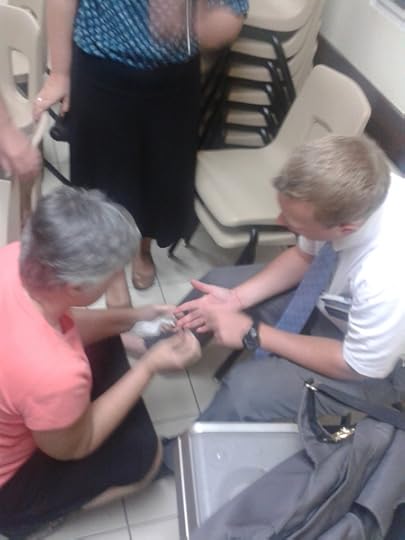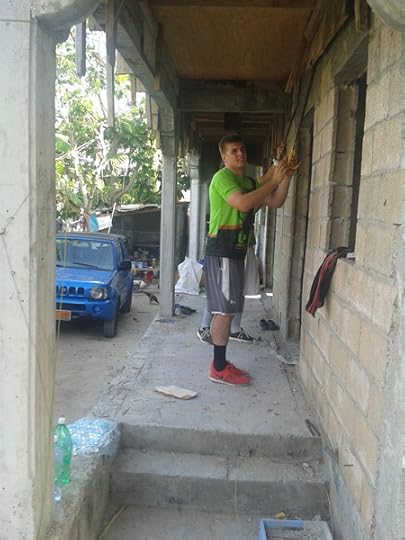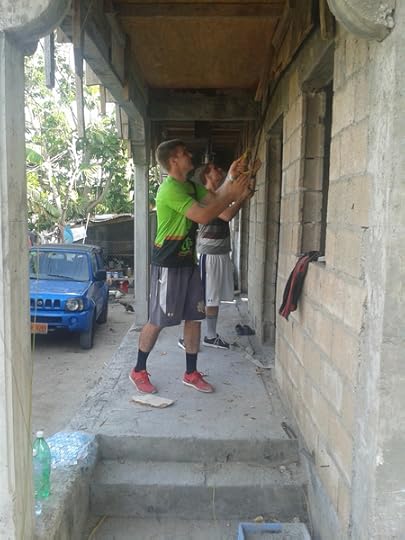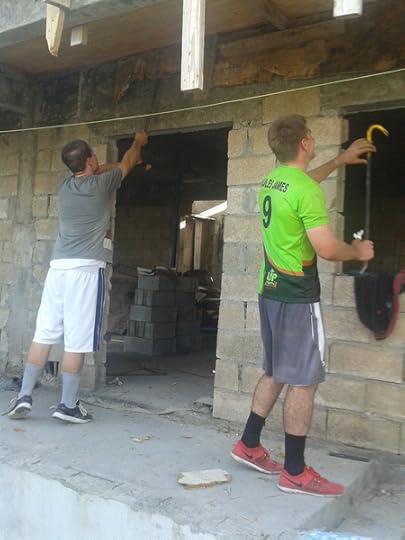Kevan Kingsley Clawson's Blog, page 14
August 6, 2015
The BIG Transfer begins…
We were contacted by President Herrington about our first transfer: Elder Broadbent was leaving the next day to become an Assistant to the President (he had been the DL here). We were also informed that there would be many more changes coming next week…
 This is our water storage for bathing and toilets.
This is our water storage for bathing and toilets.
 This is our water storage for drinking and cooking
This is our water storage for drinking and cooking  This is our food storage (about a week’s worth)
This is our food storage (about a week’s worth) This is a look at the fine meal I made Terri this week… it was supposed to be and Indian/curry/chicken dinner…and yes, we threw it away as it was disgusting!
This is a look at the fine meal I made Terri this week… it was supposed to be and Indian/curry/chicken dinner…and yes, we threw it away as it was disgusting! So we celebrated my cooking skills by taking Sister Hodge and Sister Robinson out to eat at a famous barbeque place near the college: Fat Tony’s. Not bad. They did not have everything on their menu (bad day to come I guess) so we all had pulled-pork sandwiches with fries and potato salad.
So we celebrated my cooking skills by taking Sister Hodge and Sister Robinson out to eat at a famous barbeque place near the college: Fat Tony’s. Not bad. They did not have everything on their menu (bad day to come I guess) so we all had pulled-pork sandwiches with fries and potato salad.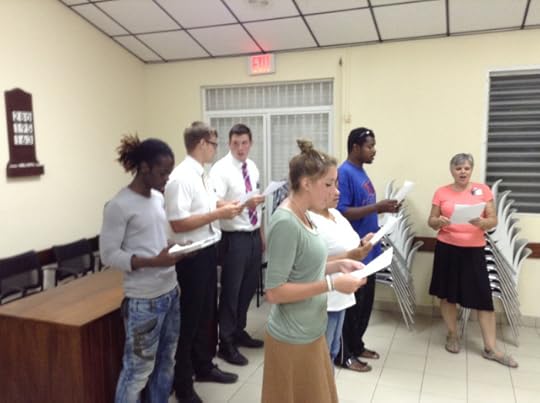 Terri has been assigned to be Choir Director and prepare a song for Branch Conference this Sunday. It was fun. The young man on the left, in the front, is new to the area. His father is a member from Jamaica that sent him to us while he is on the island (I ran into him looking for someone when I went to church one weekday). He has come to youth night, and to choir, and hopefully will come to church on Sunday.
Terri has been assigned to be Choir Director and prepare a song for Branch Conference this Sunday. It was fun. The young man on the left, in the front, is new to the area. His father is a member from Jamaica that sent him to us while he is on the island (I ran into him looking for someone when I went to church one weekday). He has come to youth night, and to choir, and hopefully will come to church on Sunday.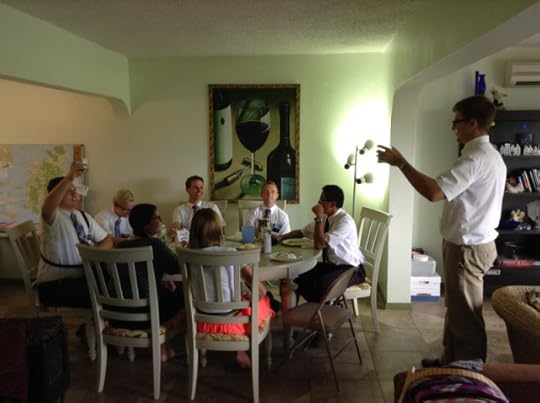 We had a farewell breakfast for Elder Broadbent today (he left for Barbados this afternoon).
We had a farewell breakfast for Elder Broadbent today (he left for Barbados this afternoon). 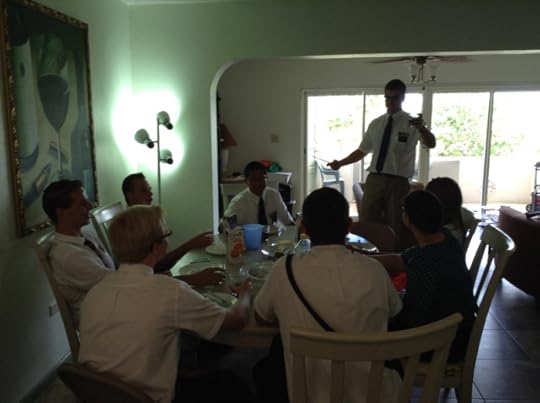 Elder Pape was making a toast
Elder Pape was making a toast 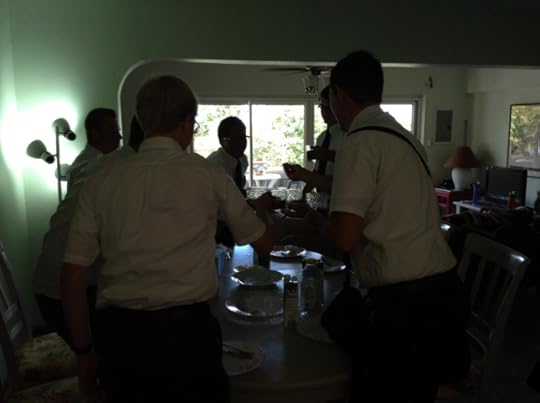
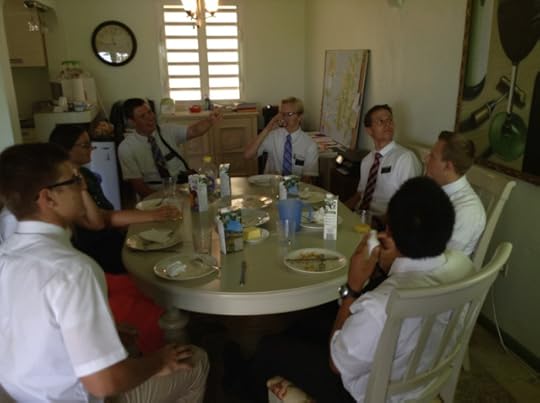 From left to right: Elder Pape, Sister Robinson (hiding in the red dress), sister Hodge, Elder Harding, Elder Spenser, Elder Broadbent, Elder Page, and Elder Mills
From left to right: Elder Pape, Sister Robinson (hiding in the red dress), sister Hodge, Elder Harding, Elder Spenser, Elder Broadbent, Elder Page, and Elder Mills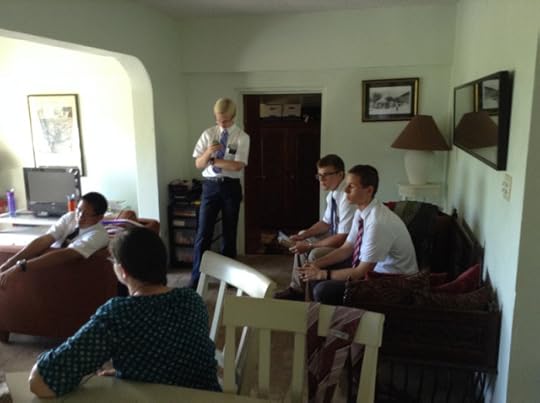
 Group photo of the Zone: L-R Back Row: Elder Pape, Elder Spenser, Elder Broadbent, Elder Harding; Front Row: Sister Hodge, Elder Page, Elder Mills, Sister Robinson
Group photo of the Zone: L-R Back Row: Elder Pape, Elder Spenser, Elder Broadbent, Elder Harding; Front Row: Sister Hodge, Elder Page, Elder Mills, Sister Robinson
 Elder Harding, Broadbent, and Pape
Elder Harding, Broadbent, and Pape
 Terri and I with Elder Broadbent, the new AP
Terri and I with Elder Broadbent, the new AP
 Youth night at the local LDS Church. They played basketball, and had a short lesson (Sister Robinson and Hodge are on the right).
Youth night at the local LDS Church. They played basketball, and had a short lesson (Sister Robinson and Hodge are on the right).
Pres. Huggins was there, and his car broke down. So I gave him a ride home. The next day I picked him up and towed his car to a nearby garage to be fixed.
The island can be very hard on vehicles due to the many hills and stop and go traffic here.


July 31, 2015
Service in St Martin
The missionaries participated in a service project here on St Martin:
Elder Page got something in his hand, so Terri was trying to perform an emergency operation after our weekly correlation meeting…
Not sure how successful she was, but he went away happy
Elder Pape and Elder Broadbent working at a member’s house
Sister Robinson hiding in the back…not sure what she is doing!
Lots of bystanders… Sister Hodge and Elders Harding, Mills and Spencer
Here are better shots of Sister Robinson
Sister Robinson is from Kanab, Utah. My mother’s father, Harold, was from Kanab. He still had family and property there when I was young, and I remember traveling to Kanab to visit them and ride horses. Harold had a horse called Kanab, which he kept in Salt Lake. We often tried to ride the horse, but always failed–the horse would gallop uncontrollably, then stop suddenly and throw us off! Kanab is a very small town in Southern Utah, way off the main highway. Sister Robinson showed us some great pictures of her riding abilities. She is a true Cowgirl!


July 29, 2015
Leadership
At District meeting this week the missionaries shared the great successes they are having here. It is amazing how the work here has grown and developed!
I shared some insights into leadership while serving on a mission:
Becoming a Leader
At some time, almost every missionary will be called to a leadership position. This is a great honor and comes with great responsibility. As a regular missionary, your example and actions influenced the many people with whom you came into contact. As a leader, you will influence many times more people. Every missionary you affect for good or ill will, in turn, affect everyone they meet. This means you must be more diligent about living the mission rules and being a good example, as you have the opportunity to inspire or corrupt those who serve under you.
Bad Leaders
Bad leaders provide excuses for those who break mission rules. They may even abet them in their efforts. I have seen leaders who arranged district and zone meetings where all who were in attendance broke mission rules. This not only promoted disobedience and dishonesty but completely sabotaged the mission president’s ability to manage the missionaries and the mission. Bad leaders are just bad missionaries magnified.
Good Leaders
Good leaders take their responsibility seriously. They know they are examples and take extra care to obey the mission rules. They are always on time, always prepared, and always positive with their thoughts or criticisms. They always leave a missionary better than they found him.
The key to motivation is splits (exchanging companions).
You can only motivate other missionaries when you are with them, by going on splits. Every missionary loves splits. Splits take them away from mundane routine and energizes them with something different, even if only for a few hours. The more often you split with those serving under you, the more influence you have. The more often you split, the easier it is to pick up problems and help resolve them; the better you will be able to see their strengths and bolster them; the more you will see their weaknesses and help overcome them.
Always be positive.
The way to any missionary’s heart is through positive reinforcement. Instead of trying to find things they are doing wrong and correcting them (any gentile can do that), spend your time looking for the good things they do and praising them. The praise will reinforce the good things being done and motivate them to do more. Tell them stories of other missionaries who have found success and help them see how they can have the same success in their area. Help them become better than they are.
Ask lots of questions.
The only way to help other missionaries with their problems is to understand them, and the only way to understand them is to ask questions. It is the story of the well again. The more you find out about them, the more information the Lord will have to draw upon to inspire you as to what to say and do while you are with them. Sometimes you will acquire information that will need to be passed on to the mission president. Do not hesitate to do this! A mission president lives and dies by the information he receives from his missionaries. If his information is limited, or if he is lied to, it can disrupt the spiritual flow of the entire mission. A good leader knows when he can directly help those under him and when he must seek the help of the leaders above him.
Give spiritual talks.
One of the characteristics of a good leader is the ability to communicate to large groups of people through talks. There is almost nothing more motivating than a powerful spiritual talk. It can bring clarity to confusing doctrine, it can help people see new ways to solve their personal problems, and it can help them feel the Spirit of God. I have already mentioned one example of how powerful this tool can be—the Regional Representative’s talk about the power of prayer. That one talk changed my life forever. It motivated me to develop my relationship with my Savior and to bring that relationship to a higher level. It helped me become a more effective servant of God. One talk. You should try to do the same.
Always be up front and honest.
Even though it is absolutely essential to create positive experiences with those you serve, do not exaggerate or mislead missionaries about who they are and what their problems are. Exaggeration and sophistry are simply lies and deception. This never helps; it only creates the illusion of helping. If you are asked your opinion, give it to them honestly and to the point—always remembering that you are there to help. If you offer honest criticism, you must also be prepared to offer honest solutions. There is nothing more debasing and frustrating than having a problem brought into the open only to have no solution. You are there to help missionaries become better people and more effective servants of God. Make sure your desires and focus are in the right direction.
If you are ever called upon to chasten a person, never chasten beyond the balm you have within you to bind up. (Discourses of Brigham Young, pg. 278)
There is a reason the scriptures talk about “reproving betimes with sharpness.” Leaders are supposed to alter the course and build the character of those they serve. When done with love and the Spirit, there is rarely anything more powerful or influential in a person’s life. I cannot count the times I was moved, even required, by the Spirit to talk to people about problems they had and what they had to do to get right with the Lord. I cannot remember a single time it turned out to be a negative experience or had anything but a positive response.
In addition to learning how to do this, you will need to teach others how to confront people and solve their problems.
For example, as a priesthood leader, I used to go on splits with the home teachers in my quorum so I could see how and what they did during their visits. I was surprised at the timidity of home teachers when confronting people about their problems. Even though they were teaching less-active members, no one asked them why they left the Church or why they had become less-active, so I showed them how to do it. I went with them and asked the tough questions for them. In almost every case, those being home taught would immediately open up and tell us the hows and whys of their lives. Then, knowing what the real problems were, we could begin to help them. The concept is simple, but it does take spiritual courage to confront people about their weaknesses and problems.
I learned this principle on my mission, but it solidified after I got married and was home teaching a less-active older couple in Utah. I had been visiting them for about six months, doing the standard home teaching visit, when one month my youth companion could not go so I went alone. I decided to try what I had learned on my mission. I asked permission to ask them some personal questions. I began asking them the hows and the whys of their less-active status. “Why don’t you come to Church anymore?” “Was there something that happened that caused you to lose faith?” At times, the air was filled with tension as my questions brought to the surface uncomfortable feelings and events. But as they were explaining to me their problems, and the reasons for them, it became clear to everyone that their reasons were really quite silly. Once they actually voiced their problems, they were able to see for themselves how silly they were being. Within two months, they were completely active again and taking the temple preparation class. I have never forgotten that experience and have repeated it many times. It is so simple, but it takes courage! You can do the same thing with the elders you serve and the investigators and members with whom you come in contact. It is a very powerful tool, but, unfortunately, it is a tool very few have the courage to use.
Help Other Missionaries
Always take time to help other missionaries with problems. Remember, we are God’s army, and an army must work together to obtain victory. I can’t count the times I had long conversations with missionaries with problems. Most of the time, they just wanted someone upon whom to unburden their souls; sometimes I was able to give counsel I think actually helped.
One missionary, nicknamed “trunky” because he was so anxious to go home, broke down and cried one night as I sat in the car with him. He was just one month away from going home, and he was lamenting all the time he had wasted while serving his mission. He had been so homesick that he spent his time and energy thinking about home and regretting all of the things he was missing while never focusing on why he was on a mission in the first place—to serve the Lord. He knew he had just wasted two years of his life, and, worse, he knew he would regret it the rest of his life. He desperately wanted to be a good missionary; to feel what it is like to have real success—but it was too late and so he cried. I will always be thankful that this elder opened up to me. I did not, could not, help him. But he helped me a great deal. After listening to his story of regret, I swore an oath that I would not waste a moment of time while on my mission. I never wanted to feel as I knew he felt. I never wanted to regret serving the Lord.
I believe I was able, in turn, to help a few missionaries in a positive way by helping them to overcome weaknesses, to work harder, and to find success in a very difficult assignment. It is not just leaders who are supposed to lift and motivate those around them—every missionary should look for opportunities to help and motivate those with whom they serve. It is not only our opportunity; it is our duty.
What to do with False Doctrine
As a leader in the district, zone, or mission, it will be your responsibility to look for, and combat, false doctrine being taught by missionaries. Sometimes it is very subtle. If in doubt, ask your mission president. While serving as a missionary for over 15 years, I have heard my share of false doctrine. The great majority is harmless and should be ignored. However, some can destroy testimonies and lives and therefore must be combated.
False doctrine by new members.
The most commonly heard false doctrine is brought into the Church by new members. This is also the kind of false doctrine you do not have to worry about—it is harmless! There is not a single new member in the Church who knows everything. Therefore, what they have not yet learned is filled in by their previous belief system, which is usually distorted and filled with doctrinal errors. This is normal. New members must be given time to progress and learn at their own rate. They were baptized into the Church knowing a few basic truths, such as the truth of the Book of Mormon, Jesus Christ is the Savior, and the restoration of the gospel. Their small testimonies of these new doctrines are primarily based upon the spiritual experience they have had with the missionaries. After they are baptized and receive the Holy Ghost, and as they grow in their understanding of how the Church works, they will begin to gain a more powerful witness of the truth. The Holy Ghost will help them discern between truth and error, and the false doctrines they still believe will slowly vanish over time. Meanwhile, when asked a question about doctrine, they will have no choice but to rely on what they believed before they joined the Church.
Heresies abound in the sectarian world. But what of the true Church? Are there heresies within even that divine institution? Paul says such was the case among the Corinthians, and it is apparent that the same thing prevails in the modern kingdom of God on earth.
Speaking of our day, Nephi said that “because of pride, and wickedness, and abominations, and whoredoms,” all men have “gone astray save it be a few, who are the humble followers of Christ.” Then pointing to these true saints, he added: “Nevertheless, they are led, that in many instances they do err because they are taught by the precepts of men.” (2 Nephi 28:14.) That is, heresies are found in the Church today, even as in the meridian of time. For instance, what of the views of some on revelation, on the age of the earth, on the theories of organic evolution, on the resurrection of the sons of perdition, on a second chance for salvation, on whether God is progressing in truth and knowledge, and so forth?
The fact is that a major part of the testing process of mortality is to determine how much of the truth the saints will believe while they are walking by faith rather than by sight. And the more truths they accept, the clearer will be their views on Spiritual matters, and the more incentive and determination they will have to work out their salvation and gain eternal glory hereafter. Heresies and false teachings are thus used in the testing processes of this mortal probation. (Bruce R. McConkie, Doctrinal New Testament Commentary, Vol. 2, pp. 362–3)
Let me give you a personal example. For months after I was converted to the Church, I continued to believe in the false doctrine of reincarnation! Nothing I had been taught or heard had told me it was wrong, so I had no reason to discard a belief I already held to be true. However, as time went on and I came to understand more fully what the resurrection of the dead meant, I came to understand that reincarnation was a false doctrine, and I changed my belief system. For months after coming back into the Church, I went through major doctrinal changes as I learned the truth and discarded my false beliefs. The fact is that this process has never ended! I am still learning new things, and modifying what I know and how I apply what I know, as the truth is revealed to me through the teachings of the prophets or through personal revelation. When you think about it this way, all members of the Church believe in and teach false doctrine to some degree or another, because none of us knows all things, and all of us are still learning. The key is to remain humble enough to continue to learn new things about the Kingdom of God every day!
I never thought it was right to call up a man and try him because he erred in doctrine, it looks too much like Methodism and not like Latter-day Saintism. Methodists have creeds which a man must believe or be kicked out of their church. I want the liberty of believing as I please, it feels so good not to be trammeled. It doesn’t prove that a man is not a good man, because he errs in doctrine. (Words of Joseph Smith, p. 183)
False doctrine by nonmembers.
False doctrine distributed by other churches and anti-Mormon groups can be devastating to investigators, new members, and occasionally even naive missionaries. There is only one way to combat this type of false doctrine—with the truth! Most of the pamphlets, books, and movies that are created by anti-Mormon groups are full of false statements, quotes taken out of context, and exaggerations. In almost every case, if you can persuade those having trouble with these to talk to you, you will be able to overcome it. Without exception, I lost an investigator or new member to false doctrine only when they refused to talk to me about it. If they read it, make their mind up about it, and then refuse to talk to you about what they have read, there is not much you can do. They have been deceived and will suffer the consequences. However, if you can get them to sit down and listen, you should be able to take them through the doctrine step by step and alleviate their concerns and fears. Remember, we have the truth! There is no reason to worry about discussing with people what they have read or heard; the truth will always win in the end.
I had an experience confronting false doctrine while serving as ward mission leader. A missionary who had been out for about a year was teaching a family that had been given anti-Mormon literature by their minister. This family, in turn, gave the literature to the missionary and wanted him to explain it. After the missionary read what he had been given, he, too, was ready to leave the Church! He finally came and asked if I could help him through this trial of his faith. No sweat. We talked for about two hours, and I took him, point by point, through the information he had been given. At the end of the evening, he was converted again and ready to combat this false doctrine on his own. How did I do it? By knowing the truth and where to find it. I was well read and knew where the quotes had been taken out of context. When I was able to show him the full context of what was said, the whole meaning changed!
I also was able to help because I knew the anti-Mormon literature of the time. Since I knew the Church and its doctrine are true, I had no fear of reading any and all anti-Mormon literature that I could lay my hands on. If I found anything I did not understand or could not easily combat, I took the time to look it up. It did not take long to discover how deceitful this literature was and how easily it could be refuted, given the right information. I remember going to the Hill Cumorah pageant with some very new members we had helped bring into the Church. There were many anti-Mormon pamphlets being handed out by other churches. Most people tried to avoid them. Not me! I walked right up to each one and took as many as I could get my hands on. While we waited for the pageant to begin, I even shared some of the pamphlets with these new members of the Church! We had some good laughs over some of the things they were trying to say about Mormons. I had no fear about doing this because I knew the truth. The new members had no fear because they knew I was confident in my knowledge of the gospel and my ability to combat anything the anti-Mormon groups tried to promote.
Now as a rule, I would recommend trying to keep this type of literature out of the hands of most investigators and new members simply because they are weak in the faith. However, it is not something you have to fear, because, once again, we have the truth!
True doctrine that is misunderstood.
The kind of “false doctrine” that is as damaging as that produced by anti-Mormons is true doctrine that is given to those not ready to hear it. This is like giving a slab of red meat to a child not yet weaned from his mother’s milk. This is perhaps the most difficult type of “false” doctrine to combat because it is true, and if those who hear it or read it do not accept it, or cannot understand it because they have no foundation to do so, how does one make them “instantly” ready to hear and understand? It is very difficult but can be done if they are willing to be patient and listen to the truth.
One incident I will never forget happened while serving in the Nauvoo Visitors’ Center. We spent a lot of time studying while serving there. This was partly because there was a lot of down time we needed to fill and partly because we wanted to be prepared to answer any question asked of us. Since I loved to read and had already read everything they had in their small library, I wrote home and had my family send all 26 volumes of the Journal of Discourses! I was working on volume one (which has many powerful doctrines in it from polygamy to the Adam God theory) when I was called to take a tour. For some reason, I left my book at the front desk at the start of the tour and asked the senior missionary couple to watch it until I got back. They kindly said they would. When I was through with my tour (about 20 minutes), this faithful couple was arguing about some doctrine they had noticed in my book (I always underline important passages), behaving like they were ready to leave the Church over some of the things they had read! I took my book back and never let anyone look at it again.
I was totally astonished that faithful members of the Church could turn away from the Church so quickly simply because they had read something they did not fully understand. The doctrines I had underlined in this book were true. This senior missionary couple, though lifelong members, obviously were not spiritually ready to hear, understand, and accept what they read. This is not uncommon in the Church. Many members struggle to understand some of the deeper doctrines of the Church. How often do you hear a Sunday School discussion about the doctrine of polygamy? Seldom, if ever. Yet this doctrine had a profound effect on both the history of the Church and the people and leadership in it! The “Adam God theory” is a doctrine not one Sunday School teacher in a hundred will touch, yet it is a wonderful doctrine taught by both Joseph Smith and Brigham Young and is, in fact, very easy to understand, if taught correctly. That, of course, is the key to all of this. Learning the truth. If both members and missionaries will take time to study the scriptures, study the words of the prophets, and gain a spiritual testimony of the doctrines of the Church, nothing will be able to shake their faith. If we come across false doctrine, we need not fear or fall away. We need only to use our faith to have the confidence to know that the Church is true and that once we fully understand the truth, the false doctrine will vanish and our faith will be enhanced. If done in such a manner, we will always find ourselves on safe ground with our faith firmly established. People have trouble with doctrine only when they jump to conclusions before finding out the whole truth.
Stand up for what is right.
When false doctrine is taught in Church (and it happens all the time), it is usually appropriate to let it go. Most members will recognize false doctrine when they hear it and will understand the context in which it was taught (usually by an inexperienced member). They can just smile, knowing that, in time, everyone settles into the truth. There is usually no need to make a big deal out of it. Just take the time to take the person aside privately to explain that what they said was incorrect, and then lead them to where they can look it up and learn it for themselves.
Occasionally though, when the doctrine is taught in such a way, as to truly mislead, or is taught by someone in authority so that it may actually be accepted as truth by the congregation, members or priesthood leaders should step in and publicly correct the doctrine so there is no question as to what the Church teaches on the subject. I have seen this done several times by bishops who felt it necessary to step up to the podium to correct false doctrine that had been expressed in a talk. This can happen often in wards full of new members who tend to take anything said over the pulpit as truth. In these cases, the bishop has a responsibility to correct any false doctrine being taught to the congregation.
On one occasion, my wife had to step forward in Relief Society to counter some false doctrine being taught. The lesson was on the priesthood and its value to women. In the course of the lesson, one of the long-time members of the Church felt it necessary to quip, “The only reason the brethren have the priesthood is because women are co-creators with God in bearing children. Men had to have something to do!” There were many new members and investigators there, all taking what was said as the position and doctrine of the Church. No one was objecting or saying anything that would lead these women to think otherwise. In tears that such a sacred power would be so haphazardly tossed about, my wife rose and corrected the false teaching and replaced it with the truth. It was a lesson no one will forget, and no one in that room will ever again confuse the doctrine being taught that day.
Embarrassing someone in public is the last thing we want to do. Under normal circumstances, it is appropriate to take the person aside in private to let them know of their error. However, occasionally, when the group is accepting the false doctrine being taught, we have no choice but to publicly correct the doctrine being taught so no one will be led astray or deceived.
Always Choose People Over Meetings
True success as a leader comes from working with people, not in holding endless meetings, filling out forms, or measuring statistics. I cannot tell you how frustrating it is to waste time sitting in an unproductive meeting, knowing you could be spending your time much more effectively talking with, and working directly with, those you are serving. Leaders who think they are being productive by creating work for those under them are unwise stewards. Their actions are doing just the opposite of what they hope. Instead of inspiring those who are working in the trenches with statistics of how well they are doing, or being able to tell them precisely where they are failing through all the paperwork they require of those below them, these leaders hinder the work of the Lord. Instead of spending productive time meeting with, and serving, those for whom they are responsible, they end up spending too much time in meetings, doing paperwork, and being a “clerk” instead of a leader.
We all understand there is a need for paperwork, and I know full well how important clerks and secretaries are. Much of the Church could not function without them. In fact, while serving as the priesthood leader in a very small ward, when given the choice of getting a second counselor or a secretary I took the secretary and made sure he was more competent than even my counselor. Why? Because I recognized how important a secretary was to make any organization work correctly! However, there are things required to be done in order to make sure the work of the Lord goes forward in an organized and proper manner, and there are things that are nothing more than make-work projects that serve no other purpose than to make some leader feel important, or like they are accomplishing something. A true leader never places a greater burden upon the shoulders of those below him than he has to. In fact, a true leader spends much of his time trying to find ways to lighten the load of those who serve under him.
As a leader, make certain any assignment you give someone has meaning. Make sure you only ask people to do things that actually help the work of the Lord go forward. Make sure you do not burden those who serve below you through unthinking decisions. Make sure you make their lives better, their burdens lighter, and their assignments meaningful to them and to those they will be serving.
“Shall I sit down and read the Bible, the Book of Mormon, and the Book of Covenants all the time?’ says one. Yes, if you please and when you are done, you may be nothing but a sectarian after all. It is your duty to study to know everything upon the face of the earth in addition to reading those books. We should not only study good, and its effects upon our race, but also evil, and its consequences.” (Brigham Young, Discourses of Brigham Young, pp. 256–257)
July 25, 2015
New missionaries
We had new missionaries come this week to add to our group (we now have a total of #8 young missionaries working in St Martin!)
 Going to the airport is always an adventure here (not too different than in the Congo– you never know what will happen! )
Going to the airport is always an adventure here (not too different than in the Congo– you never know what will happen! )  Elder Page came in on time, but Elder Spencer…well, had some issues. After going to the airport to pick him up, and waiting for over an hour, we decided to check with Liat Air to find out if he made the flight. No, he did not (in the Congo every missionary had a phone, so they could call us if there was a problem. Here, the phone stays in the area, so while traveling, no missionary has a phone…). Liat told us he had been booked on a flight the next day, and would be stuck on the island of Antiqua overnight. He finally did arrive the next day–late. Ahhh, Liat Airways…
Elder Page came in on time, but Elder Spencer…well, had some issues. After going to the airport to pick him up, and waiting for over an hour, we decided to check with Liat Air to find out if he made the flight. No, he did not (in the Congo every missionary had a phone, so they could call us if there was a problem. Here, the phone stays in the area, so while traveling, no missionary has a phone…). Liat told us he had been booked on a flight the next day, and would be stuck on the island of Antiqua overnight. He finally did arrive the next day–late. Ahhh, Liat Airways…
 At least there is usually some kind of entertainment at the airport while waiting to pick-up missionaries….
At least there is usually some kind of entertainment at the airport while waiting to pick-up missionaries….
 Here is a picture of our new missionaries: Elder Spencer (trainer) and Elder Page (new missionary being trained)
Here is a picture of our new missionaries: Elder Spencer (trainer) and Elder Page (new missionary being trained)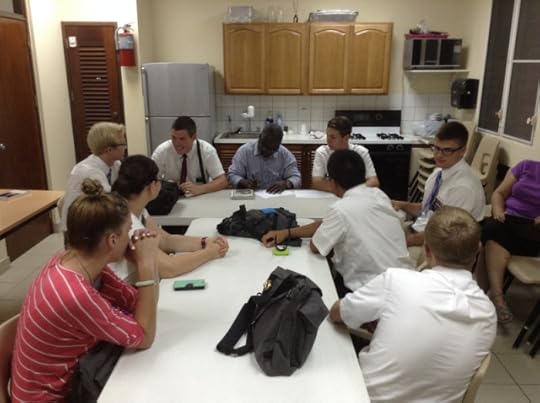 This is a typical correlation meeting held every Thursday, where we coordinate missionary work being done on St Martin with the local Branch leadership. Brother Reid is at the head table conducting the meeting, with all of our 8 missionaries in attendance.
This is a typical correlation meeting held every Thursday, where we coordinate missionary work being done on St Martin with the local Branch leadership. Brother Reid is at the head table conducting the meeting, with all of our 8 missionaries in attendance.
The work here is going very well. The missionaries are very busy with teaching appointments, and a number of people are scheduled to be baptized soon. It is quite a fun experience to be a part of!
We desperately need more senior missionaries in the field though! Now that the age to go on a full-time mission has been lowered to 18 years old, the wisdom and guidance of older missionaries is needed more than ever! What is holding YOU back? Hmmmm?


July 19, 2015
Slow week
ST Martin July 19 15
This week was a rather slow week for us—lots of studying. Terri had a few important medical issues to resolve, and I was being trained and reading up about my new assignment with the mission vehicles.
Last week we met with Pres. Herrington, and next week we get two new missionaries into St Martin (they are re-opening the 4th apartment that they closed for a short time), so we will be busy next week.
At District Meeting I shared the following information:
The importance of planning and being calm under pressure
This week we had a visit from the new mission President. In spite of all the different things that went wrong—missing plane flights, not being able to call leadership, etc.—he remained calm and sought to accomplish good while he was here.
Why was he able to stay calm?
What do you do when your planning goes wrong?
Do you think Jesus was ever ‘rushed,’ or ‘out of control,’ or gave up when things went wrong?
Part of the appeal of Jesus, and the Brethren that have been called to lead us, is their example of serenity and calm amidst the storms of life.
During the storm on the Sea of Galilee the apostles were upset and frantic…but Jesus was calm and serene. Why?
Both Jesus and the Brethren can be calm in the storm because they do two things:
They do long term planning, and take into account problems that may occur.
When problems do arise, they have faith that God will provide a way around the problems.
When Nephi traveled back to Jerusalem to get the brass plates, is a great example of this:
They had a plan (they would try to convince Laban to give them the plates)
They had a back-up plan (they would try to buy the plates from Laban)
When everything went wrong, Nephi still went forward, believing that God would provide a way.
You can do the same:
Plan
Have a back-up plan
Have faith God will provide a way when all else fails.
Developing Into Men
In a way, this chapter is written as much to the priesthood leaders as it is to the missionaries. Priesthood leaders have so much influence and power over the development of those in their charge that they must learn to use that influence wisely. Although most missionaries are teenagers, and are seen as “just boys,” they must be treated as men. People will live up to what you expect of them. If you treat them as boys, they will continue to act like boys. If you treat them as men, I promise you, they will begin to act like men.
Do not create unnecessary rules
President Pinnock was a master at teaching boys to become men. He gave us strict rules about important things but always gave us the freedom to choose about other things. It wasn’t until I was transferred to the Nauvoo mission that I learned what a truly great teacher and leader President Pinnock was. Missionaries from five or six missions had been sent to Nauvoo to work at the Visitors’ Center during the summer season. Thus, I had the opportunity to hear how other missions were being run. I was surprised to learn that the rules and conditions placed upon the missionaries by their mission presidents varied greatly from one mission to another. Many mission presidents placed upon their missionaries unrealistic rules and expectations that demoralized them and ended up detracting from the work. Here are just a few examples:
All missionaries were to wear dark blue. Blue suits with blue ties and black socks and shoes. No other color was permitted in the entire mission. Not even different ties were permitted! If elders came out with brown suits, or black suits, or pin-striped suits, they had to send them back and find dark blue suits. (I’ve seen the Prophet of the Lord wear something other than a blue suit, and even a colorful tie!)
No matter how hot it got, the missionaries were not permitted to take off their suit coats. Even in the middle of summer, and this was a mission in a southern state, they had to wear their full suit with jacket whenever they were out of their apartments. (I’ve seen the Prophet of the Lord take off his jacket during the priesthood session of General Conference when it was too hot!)
The missionaries could not listen to any kind of music—none—not even uplifting music or the Tabernacle Choir.
The missionaries were not permitted to study while eating.
Missionaries were not allowed to sleep in on P-day, and instead of getting a full day off (until 6:00 p.m.) they had to work.
They were not allowed to play basketball or other sports with the other missionaries in their district.
Every missionary had to comb his hair in exactly the same way.
Missionaries could call home just once a year, and then for only 15 minutes.
No missionary could have the color yellow in his tie.
The list could go on and on, but you get the picture. They are simply arbitrary rules drawn up by mission presidents. I’m sure they seemed like the right thing to do at the time. Perhaps the mission president wanted to show how “unified” they were by all wearing the same color suit. Perhaps one was having a problem with missionaries listening to inappropriate music, so he decided to ban all music. Some, such as everyone wearing the same hair style, I can’t come up with a reason for their creation. But this I am sure of: No matter how innocent and pure the intent, the effect of these rules can be devastating within a mission.
Almost all young men have self-esteem problems. This lack of self-confidence makes them feel inadequate, awkward, and unworthy to receive blessings from the Lord. Any problem that arises, any minor sin or infraction, will lead these young men to feel unworthy of God’s love and blessings and therefore unworthy of the natural success and joy that should come with serving the Lord. By creating rules and regulations that are unnecessary, you place undue burdens upon the shoulders of these young men. No one is perfect. No one can live every day without making a few mistakes, sleeping in late, forgetting an appointment, etc. By placing these additional rules upon the missionaries, no matter how well intentioned, you will end up causing unnecessary problems.
For through the law is the knowledge of sin. Because the law worketh wrath: for where no law is, there is no transgression. (Romans 3:20; 4:15)
What is the final result of these innocent rules? The result is that missionaries will break them. Not because they are willful, but because they are weak, because they are human. Then, when they kneel before their Heavenly Father at night to ask for His help and guidance, they are hindered from obtaining what they seek. For as they begin to ask of God, they remember: “I broke a mission rule today, therefore I am unworthy to ask God for a blessing,” and they are stopped from doing the most important thing they can do while on their mission: communicate with their God. I testify to you that this is exactly what happens and how it happens.
But what about those who break the mission rules? How does a mission president control problems that occur within his mission? He does what President Pinnock did—handles it on a case-by-case basis. It is wrong to punish every missionary for the actions of a few. It is wrong to place additional rules upon missionaries because of their youth. What do I mean? It’s simple. Do unto others what you would have them do to you. Would you ask an adult priesthood holder living within your mission to obey this rule? Would you be willing to live this rule yourself? I cannot imagine priesthood leaders going to the elders quorum president and asking him to stop listening to music, or going to the Relief Society president and telling her she cannot read her scriptures while she eats. Mission presidents would not think to place on the senior missionaries, or any adult for that matter, all too many of the rules they place on the young missionaries. Remember, if you want these missionaries to act as adults, you must treat them as adults!
We have been taught this lesson so many times and yet it never seems to stick: teach people what to do and then let them govern themselves!
When asked how he governed so many people, the Prophet Joseph Smith answered, “I teach them correct principles, and they govern themselves.” (George Q. Cannon, Life of Joseph Smith the Prophet, p. 529)
This is simple in theory but much more difficult in practice. In practice, it means that we have to trust people to behave appropriately. We have to trust these young missionaries to act like adults. We have to trust God that He will protect them and guide them when we cannot. Does anyone really believe that someone who is breaking the mission rules will suddenly reform because he has more rules to follow? Does anyone truly believe that by adding more rules all of their problems with missionaries will be solved? It is the oldest story of all: The difference between a shepherd and a sheepherder.
A shepherd leads his flock. A sheepherder drives his flock. A leader who adds more rules and burdens upon the backs of missionaries is simply using those rules as a stick in an effort to drive the missionaries the direction he wants them to go. A real leader teaches, uplifts, and motivates his missionaries to greater and greater obedience. He does not need a stick to drive them, he uses his love, knowledge, and testimony to teach them correct principles, and, when done correctly, they willingly follow him.
Do not be the sheepherder who drives his sheep only to scatter them further. Be like the good shepherd whom the flock loves and respects so much they willingly follow.
Permit them to make the tough decisions
President Pinnock never made a decision or did anything else that took responsibility away from the missionary. Again, he treated us as adults. Only in the case of serious problems, such as moral transgression, would he get personally involved. Here are a couple of examples of how he dealt with problems that arose:
Going to court.
While working in and around Philadelphia we ran into the police quite often. Many of the townships had laws against soliciting, especially at night. We were stopped by the police many times and told not to come back to an area. We did our best to be considerate of people, but the work had to go on. So, one day it finally happened. We were stopped by the police, given a citation, and commanded to stop all proselyting in the area under penalty of jail. We were told to come to court to defend ourselves at a certain place and time. Not knowing what to do, we called President Pinnock. We called, feeling scared and unsure of ourselves (whether we had done something wrong or not) and unsure of what President Pinnock would say. Would he be mad at us? His response was surprising, uplifting, and literally changed our lives. First of all, and perhaps most importantly, he assured us that we had done nothing wrong. We had been doing our duty, just as we were supposed to. Second of all, he placed the burden back on our shoulders by telling us that we would have to go to court ourselves and take care of the problem. And lastly, he gave us confidence by assuring us that we could do this, that he trusted us to do the right thing, and that he knew it would turn out all right. He finished by asking us to report back what happened and how it went.
We had gone from timid young missionaries, afraid we had done something wrong, afraid we would get yelled at, afraid even to call our mission president, to becoming confident servants of God. We took upon ourselves the responsibility for our actions; taking actions to solve our own problems and suddenly having the confidence that we would prevail. And we did prevail! After talking with President Pinnock, we prayed and then sat down to discuss what we should do to resolve the situation in which we found ourselves. We decided that the first thing we needed to do was to find a copy of the specific law or ordinance with which we were charged and read it. We went down to the courthouse and obtained a copy of the law. Upon reading it, we discovered that the law with which we were charged was for soliciting—for selling things door to door. But we weren’t selling anything! A few days later my companion and I appeared in court. The judge was on the bench and the police officer who gave us the summons was also there. After introducing the case, the judge looked at us and asked us what we had to say. I stood and told him that the ordinance with which we were charged had to do with selling goods, and that we had not sold anything, nor had we ever sold things door-to-door. We were simply talking to people about our Church. The judge then turned to the police officer and asked him if he had anything to say. He looked sheepish and a little embarrassed as he stood and said, “No, your honor.” The judge admonished us to behave and not cause problems, and then dismissed the case! As you can imagine, we floated out of that courtroom. We felt so good, so excited, and so wonderful about the whole experience! From that day forward, we became more self-confident, more willing to solve our own problems, more willing to take on greater responsibility, more like real men. And it was all because our mission president had trusted us and shown confidence in us.
Casting out Satan.
I was serving in Scranton, Pennsylvania as a zone leader. We had been having problems with Satan. I don’t mean depression and sin, I mean real confrontations with Satan! Both my companion and I had been physically attacked by evil demons. We even had a coven of witches seeking to harm us and thwart the work we were doing. Once again, we felt like we were out of our league. So we called President Pinnock—with similar results. He listened to the situation, stated he was confident we could handle things ourselves, and then gave us “back-up” in case what we did failed. He told us that if we could not rid the area of evil spirits, he would call an Apostle of the Lord to do it! Wow! Once again, we were lifted up by our wonderful mission president, who gave us confidence to solve our own problems and comfort to know that if we made mistakes, or failed in what we decided to do, we would not be condemned for trying. Further, we would be sent help if needed. I cannot explain how powerful a lesson this was to learn—how much this affected my life and the lives of my companions. We were set on a path of responsibility and self-confidence that continues even today. How easy it would have been for him to say, “I’ll take care of it,” which would have really meant, “You are too young and stupid to work this out for yourself. I will do it for you so you don’t screw it up.” Instead of treating us like children (as our parents may have treated us), he treated us like men—like equals. I will be forever grateful to him for it.
Real men get things done
One of the frustrations you learn in life is that people do not do what they say they will. They promise you everything and, if you believe them, you end up with nothing. The Savior understood this weakness in men. He talked about two sons—one who promised to do what his father wanted and the other who didn’t. But one son actually did what his father wanted. One son let his actions speak louder than words. The Savior talked about a foolish man who “talked” about building a tower but failed to plan properly and was laughed at when he could not finish the project that became a white elephant to those who lived in the neighborhood. The Savior understood that real men, men of God, do what they say they will. They do not promise to do something without first thinking it through and planning it in their minds, so they are confident they will be able to live up to their word.
Real men are simple in speech. They do not need flowery words to convince people of the truth. They say things simply and directly and then let their actions and the truth of their words stand for themselves.
Real men are results oriented—they don’t care about the pomp and fanfare that comes with life; they care about results. They care about actually getting things done. As President Pinnock used to say:
Always remember that a “results-oriented” person is the one who gets the job done. Concentrate on results, results, results.
Real men don’t just talk, they do. Remember the famous saying of the Prophet Spencer W. Kimball: “Just do it!” He, too, understood this simple principle. Enough meetings. Enough planning. Enough talking. Now, just do it!
Continuing on his teachings about serving and doing what needs to be done to carry the work forward, President Pinnock often talked about the dedication we need to have in the service of God:
Total dedication becomes one of the great steps an individual takes in his attempt to serve the Savior. Periodically we hear that someone “does the right thing for the wrong reason . . .” and that might be true. But never forget it is better to do the right thing for the wrong reason than not to do the right thing at all.
To the Savior, few things were more offensive than those who talked but did nothing. Even if you end up making a mistake, or just foul things up, you will be looked upon in a much better light than those who do nothing. At least by acting and making mistakes, we are learning that if we do not act, for better or worse, nothing will happen at all!
The worst-case scenario
What happens if you find yourself with a mission president you do not like or cannot get along with? Perhaps one who seems to create arbitrary rules that you find hard to accept and live? What do you do? The answer is to be obedient to the best of your ability. God will always bless obedience, even if it seems to make little sense at the time. Remember what happened to Adam after leaving the Garden of Eden? He was commanded to sacrifice animals to God but was not told why. I don’t know about you, but that would have frustrated me to no end! I would want to know why something was being done before I would spend the time and effort to do it! But Adam, in spite of whatever reservations he may have had as to why he was being asked to do this thing, was obedient. He trusted God and believed that if God asked him to do something there must be a good reason for it! So, he obeyed. It was only later that the importance of what he had been asked to do was revealed to him.
And Adam and Eve, his wife, called upon the name of the Lord, and they heard the voice of the Lord from the way toward the Garden of Eden, speaking unto them, and they saw him not; for they were shut out from his presence. And he gave unto them commandments, that they should worship the Lord their God, and should offer the firstlings of their flocks, for an offering unto the Lord. And Adam was obedient unto the commandments of the Lord. And after many days an angel of the Lord appeared unto Adam, saying: Why dost thou offer sacrifices unto the Lord? And Adam said unto him: I know not, save the Lord commanded me. And then the angel spake, saying: This thing is a similitude of the sacrifice of the Only Begotten of the Father, which is full of grace and truth. Wherefore, thou shalt do all that thou doest in the name of the Son, and thou shalt repent and call upon God in the name of the Son forevermore. (Moses 5:4–8)
As a reward for Adam’s obedience, both he and Eve received a witness of the truth, and a promise that they would live again in God’s presence.
And in that day the Holy Ghost fell upon Adam, which beareth record of the Father and the Son, saying: I am the Only Begotten of the Father from the beginning, henceforth and forever, that as thou hast fallen thou mayest be redeemed, and all mankind, even as many as will.
And in that day Adam blessed God and was filled, and began to prophesy concerning all the families of the earth, saying: Blessed be the name of God, for because of my transgression my eyes are opened, and in this life I shall have joy, and again in the flesh I shall see God. And Eve, his wife, heard all these things and was glad, saying: Were it not for our transgression we never should have had seed, and never should have known good and evil, and the joy of our redemption, and the eternal life which God giveth unto all the obedient. And Adam and Eve blessed the name of God, and they made all things known unto their sons and their daughters. (Moses 5:9–12)
As difficult as it sometimes is to obey the directions given us by those placed in authority over us, we must learn to obey. When you get into a position of leadership, remember what you learned and how you felt when others might have used unrighteous dominion and make sure not to repeat it! Learning to follow and obey is an important part of learning how to become a good leader. If you do not know what it takes to be a good follower, you will never learn what it takes to be a good leader. So, after all is said and done, learn to obey. Put your ego and your poor attitude in your pocket and humble yourself! Besides, it will be good medicine for your soul.
Matthew 21:28–31
Luke 14:28–30
Matthew 5:33–37


July 13, 2015
More Herrington visit
Here are a few more pics from the Herrington’s visit on St Martin.
 Elder Hatch, one of the Assistants to the President arrives
Elder Hatch, one of the Assistants to the President arrives  President and Sister Herrington arrive at the French airport (there are two airports on St Martin, and often we have to ‘divine’ which airport to go to!)
President and Sister Herrington arrive at the French airport (there are two airports on St Martin, and often we have to ‘divine’ which airport to go to!) 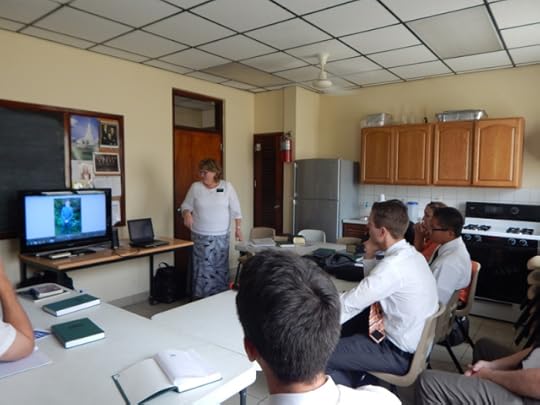 Sister Herrington giving information and instruction to the missionaries
Sister Herrington giving information and instruction to the missionaries Here is a group shot of the St Martin Zone in front of the local chapel:
Here is a group shot of the St Martin Zone in front of the local chapel:
Left to right, back row: Elder Mills, Elder Broadbent (District Leader), Elder Harding, Elder Pape (Zone Leaders); Front row: Sister Hodge, Sister Robinson, President Herrington, Sister Herrington, Terri, Kevan And there they go! Two days late…but we are all happy they could spend extra time with us here!
And there they go! Two days late…but we are all happy they could spend extra time with us here!


July 12, 2015
St Martin children sing
President Herrington visits St Martin
President and Sister Herrington visited St Martin this week. They are the new mission president for the new Barbados Mission. They came to visit the island and to interview the missionaries serving here.
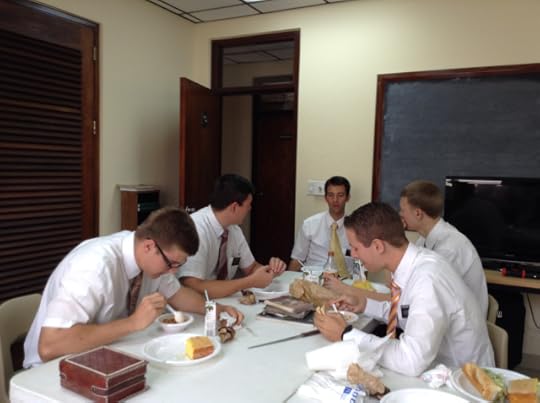 The missionaries feast on lunch provided after their short meeting with Pres. Herrington, and while waiting to be interviewed.
The missionaries feast on lunch provided after their short meeting with Pres. Herrington, and while waiting to be interviewed. Sister Herrington talking to Sister Hodge
Sister Herrington talking to Sister Hodge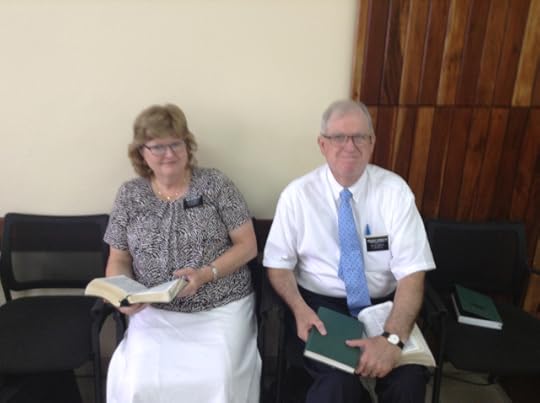 Pres. and Sister Herrington waiting for sacrament meeting to start. They were supposed to leave Saturday afternoon, after meeting with the missionaries, but missed their flight! (we all read their itinerary wrong, and thought the plane left later than it did–so they stayed for a couple of more days, and were able to come to church on Sunday, which gave them time to give some great counsel to the Branch)
Pres. and Sister Herrington waiting for sacrament meeting to start. They were supposed to leave Saturday afternoon, after meeting with the missionaries, but missed their flight! (we all read their itinerary wrong, and thought the plane left later than it did–so they stayed for a couple of more days, and were able to come to church on Sunday, which gave them time to give some great counsel to the Branch) Terri playing piano for the Branch (one of her many duties…)
Terri playing piano for the Branch (one of her many duties…)
The Pres. and entourage leave early Monday morning to head back to Barbados.


July 8, 2015
Success in St Martin
We have a new missionary, Elder Harding, who is serving with Elder Pape as a Zone Leader in the French area on St Martin. He is a great missionary and will be spending his ‘last days’ here on the island. He said that Pres. Mehr asked him where he wanted to serve in his last area, and he told him St Martin…so here he is!
We took one of the cars in for service and it turned out it needed a LOT of service! All four breaks, the alternator, and a new battery, along with the usual service stuff…
We all received training on Saturday in becoming self-reliant. All members of the Church here will begin receiving this training, along with specific training on how to gain more education, greater job skills, and even how to start their own businesses!
I spent part of the day on Monday fixing problems in one of the missionary apartments (a light that did not work and a handrail that was broken). And confirmed that all the safety measures in the apartments were working (such as the smoke/CO alarms, propane gas locations, etc.). I think perhaps they might have had another accident, because they were directing everyone to double check these items…
Since it is the first of the month I have to do all of the monthly reports, and pay all the bills (rents, utilities, gas, etc.). We also took part of a day to help move one of the members to their new apartment.
We also took a member to the airport, and had the opportunity to teach with the missionaries a few times.
The Fast and Testimony meeting was great—making two in a row that have been extraordinary! The spirit was so powerful…many visitors told us they had never been to a meeting so full of the spirit!
The missionary work here is going very well—the young missionaries continue to increase the number of discussions they are teaching, the quality of their teaching, and the number of people committing to baptismal dates. It is quite exciting!
As some of the missionaries have been having problems getting people to commit to baptism, I taught and handed out the following lesson at last week’s District Meeting:
The Point of Baptism
The most important and sometimes most difficult process to learn is how to commit people to baptism. Most people perceive the truth when they hear it, but understanding the truth and being willing to live it are two different things. Developing the ability to convince people to commit to living the truth—to commit to baptism—is the final step in learning how to be a great missionary. This chapter will deal with how to approach this subject, how to deal with investigator concerns, and how to deal with your own fears.
How to Commit People to Baptism
For most missionaries, the most difficult discussion to teach is the one where they commit the investigator to live the commandments and be baptized. It is stressful because missionaries want so badly for them to say yes, but fear they will say no. You don’t want to scare them away by being too pushy, on the other hand, you know you need to broach the subject and prepare them for “the question”: Will you be baptized?
Be up front and honest.
As stated in a previous chapter, the best way to prepare people to say yes to the question of baptism is to let them know up front that baptism is a requirement for joining our church. This is such an important principle that it deserves repeating! Almost everyone will say no the first time you bring up the subject of baptism. They will say they are interested in hearing what you have to say, but do not want to join the Church. You should always come back with an assertive and positive response, stating that you knew all along how they felt and that you did not expect an affirmative response, at least not now.
“Of course we don’t expect you to join our Church right now. In fact, we would not permit you to join right now! You see, God has a plan for all of us. He expects each and every one of us to make covenants with Him to prove our worthiness. In these covenants, we promise to do certain things for God, such as keeping his commandments; and God promises to do certain things for us, such as bless our families and us on earth and inherit the Kingdom of God after this life. Because these covenants are so sacred, we do not permit anyone to enter into them without first making sure they are prepared to live them. The discussions we teach will give you an understanding of what God expects. After you hear all of the discussions, the decision will be totally up to you: you can either decide to go on with your life as it is, or you can decide to accept the promises God has given and enter into the covenant of baptism.”
At this point, two things have happened. You have calmed their fears about making a commitment right now, and you have given them something very deep and sacred to ponder. They will want to know what these sacred covenants are! After you have broached this subject once, you never have to worry about it again. Whenever it comes up, if they are still nervous or say they don’t want to join, you can remind them that you told them up front it was their decision and if they are not ready, it is okay. Then continue to teach them until they are ready.
Don’t wait.
The longer you wait to bring up the idea of baptism, the harder it will be to get them to commit. People must have time to ponder before making a life-changing commitment. If you “spring” it upon them at the last discussion, of course they will say no! “You never told us you expected us to join your Church!” “You never mentioned we had to get baptized!” People need time to decide. More importantly, people need time for the Spirit of God to work upon them. This is a recurring theme in this book. God cannot draw from an empty well. If your investigators have never been taught about baptism, if the thought isn’t even in their mind, how can God then work on that thought? Paul understood this when he said, “And how shall they believe in him of whom they have not heard?” The Spirit must have something to work upon. If you place the idea of baptism in their minds, even if they reject it at first, it will give the Spirit of God a chance to work upon them over a period of time. Then when you do ask the question, they will be prepared to say yes.
Make sure they are ready.
For most missionaries, this is not a problem. By the time they find the courage to ask their investigators to be baptized, they are more than ready! But occasionally there will be some missionaries, even some entire missions, so zealous to get baptisms they do not wait until the family is truly ready. This creates a frightening scenario, because it almost ensures the family will eventually leave the Church. They will be the seed in the Savior’s parable of the sower planted in soil without dirt; therefore, they did not grow roots. As a result, it was just a matter of time before they withered and died.
You must make certain your family is ready to take upon themselves the sacred covenants of God. This does not mean you take upon yourself the responsibility to decide for them (God forbid) as only they can say yes or no; only they can decide, only they will be held responsible for whatever decision they make. What does it mean, then, to make sure they are ready?
– It means you make sure you have not taken any shortcuts.
– You teach them all the discussions.
– You make sure they understand what you have taught.
– You make sure you have resolved all their problems and concerns.
– They are going forward with full knowledge of all of the commitments and responsibilities they will be taking upon themselves. If you help them hide their sins (oh, it really isn’t that bad) or pretend to overlook the problems they have with the doctrine (I know they don’t believe in prophets, but they want to be baptized!), you will be doing both them and the Church a great disservice. You cannot make the decision for them, but you can make certain you have taught them correctly and well!
Get the members involved.
When investigators are hesitant to be baptized, it is rarely due to the doctrine (after all, it is the truth). It may be a result of their fear of the change in their lifestyle or of meeting and associating with so many new people. The way to overcome this fear is to make certain they meet as many members as possible while you are teaching them the discussions. I promise you, the members can do a much better job of overcoming their fears about baptism than you! Put away your pride, realize you cannot do it alone, and get some help from the members.
Even if you find it hard to get members to split, as your investigators near baptism the leaders of the ward should come and help you. For example, the elders quorum president should come to meet the father and talk about the priesthood, the Relief Society president should come meet the wife, and the Young Men’s and Women’s presidents and Primary president, etc. (or their counselors) should come meet the various members of the family. The more members that visit the family prior to baptism the better, as your investigators will then feel more comfortable coming to church because they already know people.
Make sure they go to church.
One of the natural fears people have is the fear of the unknown. Getting your investigators to come to church as soon as possible is the best way to get them over this fear. They need to meet other members of the church, know where the church is, where to park, where the door is, and which class to go to. These things may seem small but can loom quite large in the minds of your investigators. This also means that before they go to church, you are to tell them all about it. Not just what time it starts, but everything about it. You tell them, “We start in this class for an hour, then go here for an hour, then go into sacrament meeting for an hour. The sacrament is bread and water, and you should not partake of the sacrament yet, until after you are baptized.” The more you tell them about church and the more specific you get, the more at ease they will be when they get there.
Don’t turn them into professional investigators!
If you have taught your investigators all the discussions and they still refuse to be baptized, it is time to move on. Occasionally, people take a long time to make up their mind (I have seen some people take a year or more). As missionaries, you do not have that kind of time. When it comes to extended teaching assignments, it is appropriate to turn these investigators over to stake missionaries to continue the work. As full-time missionaries, you should not continue teaching a family very long after they have progressed through the discussions. If you continue to visit and eat dinner with them without having them make any kind of commitment to the Church, you will create professional investigators! It is better to leave them for a time—months, even years—so another missionary might have a better chance of committing them to baptism when they are ready.
I had an example while serving as a Seventy in Utah. We were teaching the discussions to a young couple who, after all the discussions were given, declined to be baptized. We were not sure what to do. We could not simply give them the discussions again, and we did not feel it was in our best interest to meet with them every week, as though we were their home teachers, since they were not members of the Church. After some discussion, we turned them over to an older stake missionary couple. They were wiser and more patient than we could have been with this young couple. A year later, the diligence of these stake missionaries paid off—the couple was baptized.
Another example happened in Connecticut while I was serving as ward mission leader. One of the part-member families I was home teaching finally committed to taking the missionary discussions. It was another example of simply being bold and asking the nonmember husband, directly and forcefully, to hear all the missionary discussions. Once he said yes, the path seemed clear: have the full-time missionaries teach this family and get the husband baptized. Everything seemed to be going exactly as planned, until all the discussions had been taught and the husband still refused to be baptized. He was not yet ready. What should we do? Once again, we decided to turn the family over to someone older and wiser. We assigned this family to one of the senior missionary couples serving in our ward. About eight months later, this good husband and father was baptized.
This is how it should work. Full-time missionaries teach only those who are prepared to be baptized into the Church. If all the discussions have been taught and your investigators still refuse to come to church and be baptized, they should be turned over to the local priesthood—the stake or senior missionaries—to continue contact. This will prevent them from becoming “hooked” on the missionaries. It will prevent them from becoming professional investigators.
What Happens if Only Part of the Family Wants to Join?
One of the most difficult decisions to be made occurs when only part of the family is ready to be baptized. Generally speaking, it is good to wait as long as possible before creating a part-member family. If one family member is not ready, wait a while longer, especially if it is one of the parents. If the father is not ready but the rest of the family is, wait. It is better to be patient and baptize the family as a group rather than create tension within the family unit by baptizing only part of the family.
Remember that the family is the most important unit in God’s kingdom. It is inappropriate to be about the work of splitting up families. Whenever possible, the family should be taught together, progress together, and be baptized together. No missionary should be so zealous as to tear a family apart by baptizing only part of the family when, with patience, they could have been baptized into the Church together.
Sometimes you just have to let them go and let time resolve the issues and problems. Let me give you an example.
We were teaching an older couple who seemed very interested in joining the Church. After a while, the husband became disinterested and even antagonistic toward us while the wife continued to progress toward baptism. It became clear they were going in separate directions. They had been perfectly happy as a couple until we had introduced the gospel into their family, but now it seemed as though the gospel would break up their family. Finally, it came to a crisis. If the wife continued with the discussions, their marriage would probably end. The husband demanded she stop meeting with us. What should we do? What should they do? All I can tell you is what finally happened and I believe the Lord accepted it. The wife, with our blessing and encouragement, decided to stop taking the discussions. Her relationship with her husband had to come first. We knew that God would bless this good woman either way. It was a tough decision and we believed that, in time, her husband might come around. I knew that God could see the desires of her heart, and she would be blessed and, in time, be rewarded for her faith.
There is another principle involved, however. Every man, woman, and child will have to stand before the bar of God to be judged by their works. What they did in this life and the decisions they have made, including the decision to accept the gospel and be baptized will all be a part of this judgment. Since this is a personal decision, not a group one, each individual must be accepted on their own merits and desires. What this means is that in spite of our desire to bring families into the Church together, sometimes this is impossible. If it becomes clear some members of the family will not join the Church and others are definitely ready, we should not, can not, deny them the blessing and opportunity to be baptized. There is another profound principle behind the decision to proceed with baptism. The spiritual growth within the faithful spouse will eventually save the husband or wife.
For the unbelieving husband is sanctified by the wife, and the unbelieving wife is sanctified by the husband: else were your children unclean; but now are they holy. (1 Corinthians 7:14)
I believe this principle is much broader than stated here. I believe a parent or parents can sanctify their children and faithful children can sanctify their parents. I believe we underestimate the power of the Spirit to influence those around us. The presence of the Spirit of God touches and influences everything around it. When thinking about this principle, I always think of a little history. Just a few years before the Iron Curtain fell and eastern Europe and the Soviet Union opened their doors to the preaching of the gospel, a significant event happened. A temple of God was built in East Germany, behind the Iron Curtain. I believe the building of this temple was directly responsible for the eventual change in the hearts of the people of Germany, which, in turn, led to the fall of the Iron Curtain. This being true, what influence can a faithful member have on their spouse who lives with them day after day?
Even in part-member families, the family must come first. This is a principle that must be affirmed over and over if the entire family is to one day become united in Christ. Let me give you an example.
We were teaching a wonderful family in Connecticut. The wife had been a Jehovah’s Witness, which almost cost her her marriage. The Jehovah’s Witnesses demanded she always put their church first, so, time after time, she was choosing strangers over her husband and children in matters that directly affected their family like tithing, finances, and the time she spent away from her family. Eventually the family was in crisis, and the wife had to choose between the Jehovah’s Witnesses and her husband. She chose her husband.
Not long afterward, she met the Mormon missionaries and was converted. But once again, perhaps because of her recent history with the other church, there arose a conflict within the family. Her husband did not want her to be baptized. As ward mission leader, I went with the missionaries to help resolve the conflict. After assessing the situation, I told the husband that, considering the circumstances, we would not baptize his wife without his permission as we did not want to break up his family or do anything that would cause problems for them. We decided to follow the principle we had been taught in almost every priesthood meeting we attended: The family comes first.
Within a few days after our meeting with this family, the husband gave permission for this good woman and her son to be baptized. Our concern for the unity of his family had convinced him this Church would be good for his family. I was assigned to be their home teacher. Not long afterward another problem arose—tithing. This sister had been faithfully paying tithing on the money she earned at her job. The family was going through some tough financial times and the husband demanded she stop. I was brought in to resolve the problem. Once again, I put the family first. I told this sister she was to obey the wishes of her husband and not pay tithing. I told her that God knew her heart and knew that she would pay tithing if she could. I told her it was more important to keep a good relationship with her husband than to fight over money. I told her I knew the time would come when she would be able to participate in this law and receive its blessings. I told her how lucky she was to have an honorable husband who worked hard, financially supported her and her children, and did not abuse them but loved and cared for them. This was not a man for whom she wished to cause problems, but one with whom she wanted to stay! I read her the scripture quoted above and promised she would have a much greater influence on her husband by loving him than by doing things to disrupt her family.
Once again, her husband was surprised and touched by the tone of my words. How different from the other churches he had experienced! Instead of trying to divide his family, we were doing everything we could to keep them together. It wasn’t long before she began to pay tithing again with the full blessing of her husband. Soon he was attending Church socials and participating in Church at various times. We eventually moved, so I don’t know their status now, but I’m sure we did the right thing. She remained faithful, her son was married in the temple, and her husband fully supported her membership. In time, I know he will join the Church, too.
We will never know, nor can we as mortals adequately judge, the trials people must go through to become members of the Church and remain active. I remember one wonderful young woman for whom I was a home teacher. She had been converted and had been a faithful member for about two years when she came up against a real problem—marriage. There were no available men in the ward and she wanted children and a family. She fell in love with a nonmember. She had to choose between the Church in which she believed and loved, and the man she loved and could have a family with. She chose to experience the love of a good man and have a family, and I could not tell her she was wrong! I could not judge her heart or the path on which the Lord might take her. I wished her all the blessings that could come to her in her life, prayed she would find joy, and said goodbye.
These are hard decisions! We are but mortals with limited understanding about how God works in the lives of men on earth. Therefore, we cannot presume to judge the decisions of others, especially when it concerns something so sensitive, private, and personal as love and family. We are fortunate to be able to leave that judgment in the loving hands of Jesus Christ.
If they say yes, baptize!
I have stressed a lot the need to make certain you teach people properly, so they understand what you have taught, and that you do not baptize them if they are not ready. But the bottom line is, if they desire to be baptized, you must baptize them! You cannot judge their hearts, only God can. You cannot assume they are lying, or assume they are not ready, or assume anything else about them. You must take them at face value and ask the standard questions prior to baptism. If they say yes, baptize them!
In the first place, I want to say to the Elders who go forth to preach the Gospel—no matter who may apply to you for baptism, even if you have good reason to believe they are unworthy, if they require it, forbid them not, but perform that duty and administer the ordinance for them; it clears the skirts of your garments, and the responsibility is upon them. (Discourses of Brigham Young, p. 327)
What to Do After They are Baptized
People fall away from the Church for a variety of reasons but primarily as the result of two things: either they were not prepared properly before being baptized, or the members of the Church did not properly follow up after baptism. Let us talk about the follow-up that must take place with every new member of the Church.
Joint member/missionary visits
Preferably these visits should begin before investigators are baptized, but it must certainly occur after they are baptized. There must be a formal “passing of the torch” from the missionaries to the home teachers. There should be at least two visits where both the missionaries and members go together to visit the new member. The new members know the missionaries and trust them. This feeling of comfort and trust must be passed from the missionaries to the home teachers. This is very simply done by teaching a few joint lessons together. This will show the new members that the missionaries trust the home teachers, so the new member will trust them as well. By teaching together, they show a united front that the doctrine taught is the same, and the Spirit of God is present. There is a transfer of trust.
New member discussions.
All new members should be given the new member discussions in the weeks following the baptism. The stake missionaries, senior missionaries, home teachers, or any combination of the three can teach these lessons. These discussions are simply a review of the missionary discussions with a greater emphasis on the temple, so they can begin preparations for the temple. These discussions will reinforce everything taught by the missionaries. The new members will remember the sweet Spirit they felt and why they made the commitments they did. The lessons will solidify their testimonies and give them another chance to bring up, and overcome, any doctrine they did not understand or principle they hesitated to believe.
Give new members a calling.
Every new member should be given a calling as soon as possible. Some bishops are hesitant to call new members to positions of trust, assuming that because they are new they will not do a good job or will make mistakes. These bishops must overcome their misgivings because it is in error. Everyone makes mistakes in their callings; no one is perfect. The growth these new members will gain far outweighs any problem they might create or experience while serving in that calling. What do branches do? Some countries have branch presidents who have been members of the Church only four months! If they can survive and grow with the help of the Lord, surely your branch or ward can continue to grow by placing inexperienced new members in positions of trust within the ward.
Give them a new goal: the temple.
Make sure new members understand their eternal progression has just begun. As they begin to serve faithfully, they must begin preparations to enter the temple of the Lord. Obtaining their temple endowments and having their family sealed for eternity should be a well-established goal for every new member, even before they are baptized.
Frequent interviews with the bishop.
The bishop should set aside time to interview all new members on a regular basis. Not only should he interview them after baptism and for new callings, but he should interview them every few months to gauge their progress, foresee any problems, and make assignments to other leaders in the ward to help them through the first few difficult years as members.
Romans 10:14
Matthew 13:3–9
July 1, 2015
The new Barbados Mission
Terri and I are now officially part of a new mission: the Barbados Bridgetown Mission
 This map shows the islands that are now a part of our mission, including all of the French islands and French Guiana. The other mission is called the Trinidad Port O Spain mission, which includes Surinam and they added the ABC islands just north of Venezuela to this mission–including all of the Dutch speaking islands.
This map shows the islands that are now a part of our mission, including all of the French islands and French Guiana. The other mission is called the Trinidad Port O Spain mission, which includes Surinam and they added the ABC islands just north of Venezuela to this mission–including all of the Dutch speaking islands.
Our new mission president, Pres Herrinton, will be visiting St Martin on July 10 to see the island, visit with the local Branch leadership, and interview all of the missionaries here. It is just one stop on his whirl-wind tour of the mission he will be overseeing for 3 years.


Kevan Kingsley Clawson's Blog
- Kevan Kingsley Clawson's profile
- 14 followers



